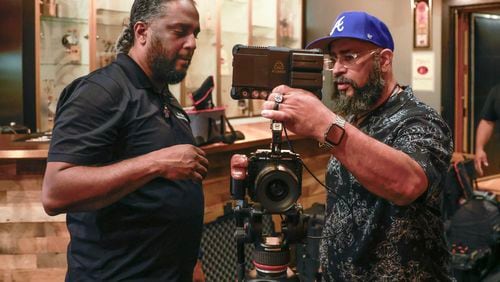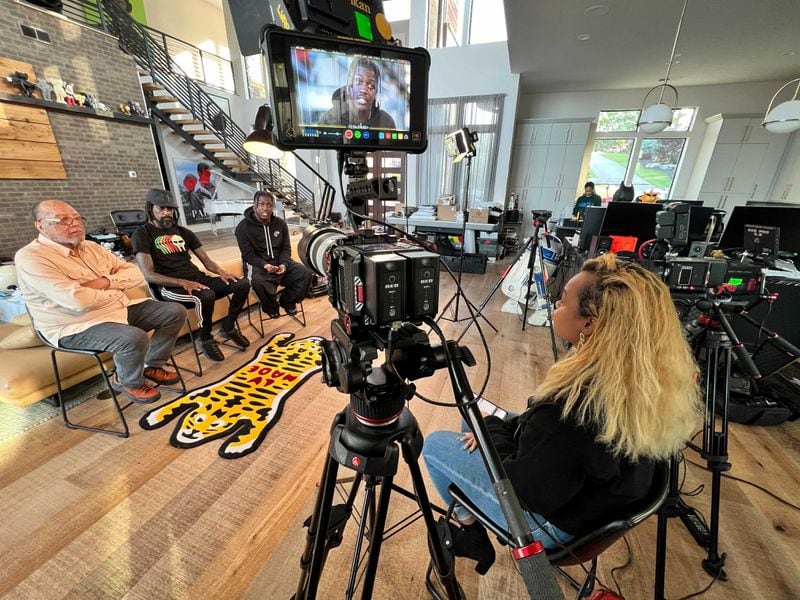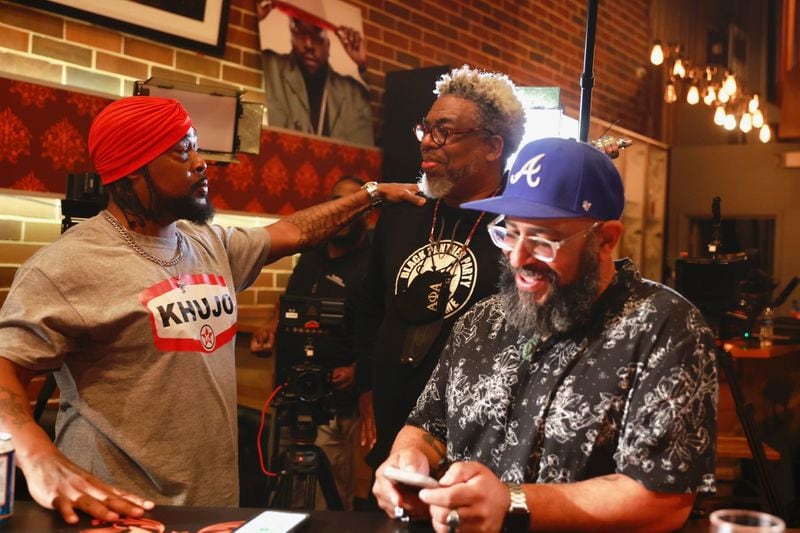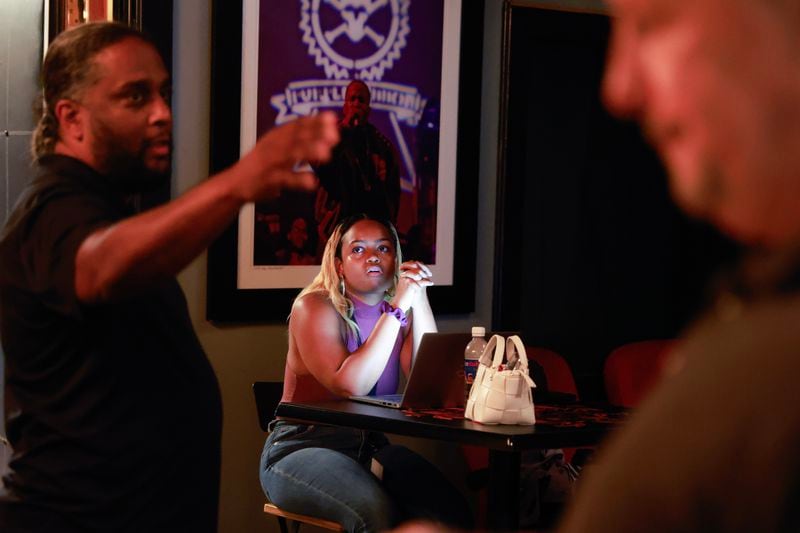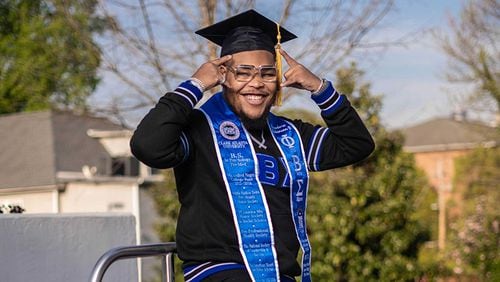The day was August 3, 1995. The location: The Paramount Theater inside Madison Square Garden in New York City. The event: The Source Awards.
Rap music had been around more than 20 years but had really only broken out into the mainstream over the previous decade. At that point, the hottest hip-hop artists came largely from New York and Los Angeles. Artists of the year were New York’s Wu-Tang Clan and Los Angeles rapper Snoop Dogg.
But who won for best new group? Atlanta duo OutKast. The New York crowd could be heard booing as they came up on stage. André 3000 of OutKast read the room and provided a defiant clarion call: “The South got something to say.”
That resonant statement became the title of The Atlanta Journal-Constitution’s very first full-length documentary, which debuts Thursday at Center Stage in Midtown with an evening screening and a series of panel discussions during the day. (Tickets available at live.ajc.com.)
The film ― directed by AJC’s acclaimed videographers Ryon and Tyson Horne and written by AJC reporters Ernie Suggs and DeAsia Paige ― will be available for a limited time beginning Nov. 3 at ajc.com/hiphop. The movie is also being shopped around to various streaming services for wider distribution.
André 3000′s line “The South got something to say” became “prophetic,” said Speech of Atlanta’s Arrested Development in the beginning of the film. “Because it’s a simple phrase. It’s not really a radical phrase. Everyone has something to say. He said the South has something to say. What makes that powerful is to see what happened after.”
The movie project began in April as a way to commemorate the 50th anniversary of hip-hop, spearheaded by new AJC publisher Andrew Morse and new editor-in-chief Leroy Chapman. Over the late spring and summer, Suggs said he and Paige talked to more than 70 people including hip-hop historians and journalists, producers, rap stars and politicians.
The AJC has experience with short-form documentaries and had plans for a video series centered on Atlanta hip-hop. But Morse, who worked on broadcast documentaries during his time at CNN, pushed for a theatrical-length film, something the AJC has never produced.
Over the late spring and summer, Suggs said he and Paige talked to more than 70 people including hip-hop historians and journalists, producers, rap stars and politicians.
The Horne brothers and Suggs have been in Atlanta since the mid-1990s. Paige only arrived in town a year ago but she said everyone had their own connections and was able to nab plenty of key interviews in a tight time frame.
“It was very intense initially,” Paige said. “I didn’t think things would happen.”
Suggs, a Brooklyn, New York, native who joined the AJC two years after André 3000′s “shot heard around the world,” said he wanted to explore the scope of Atlanta history “with a hip-hop soundtrack.” The film touches on everything from the election of Maynard Jackson as the first Black mayor of Atlanta five decades ago to the Atlanta Child Murders of 1979 to 1981 to the 2020 George Floyd protests.
“The movie made me better appreciate how Atlanta was able to flip hip-hop and make it a cultural and global phenomenon,” Suggs said.
Credit: DeAsia Sutgrey
Credit: DeAsia Sutgrey
Key figures interviewed in the film include T.I., Jeezy, Dallas Austin, Jermaine Dupri, DJ Drama, Lil Yachty and members of Goodie Mob as well as U.S. Sen. Raphael Warnock, former U.N. ambassador and Atlanta mayor Andrew Young and current Atlanta mayor Andre Dickens.
Suggs said the biggest miss was OutKast themselves. Notoriously media shy André 3000 declined to participate and the producers couldn’t line up a time to meet up with Big Boi. (They used archival interview clips instead.)
But the film spends quality time with the first notable Atlanta rappers from the 1980s Edwin “Mojo” Lyons (”Let Mojo Handle It’) as well as his friend MC Shy D (”I Gotta Be Tough”).
And while the film’s focus is on Atlanta, the Horne brothers did fly up to New York City and spoke to the likes of Doug E. Fresh and DMC of Run DMC who gave plenty of props to the South. They also connect the dots between Georgia native and R&B funk legend James Brown and hip-hop.
The doc delves into how skating rinks and talent shows became the “incubators of the talent that became the creative class,” said Jocelyn Wilson, a Georgia Tech professor and historian, in the film. Dance crews mattered, too, as did the yin-yang of strip clubs and church on the scene, the doc noted.
“We wanted to not just show how Atlanta became a centerpiece of hip-hop but the impact of the soulfulness and spirituality of church in hip-hop,” said Ryon Horne.
The doc digs out some delightful video of producer Dupri in his teen years. Dupri, of course, was known for turning Kris Kross into Atlanta’s first full-fledged rap stars with the No. 1 hit “Jump” in 1992. (The film also noted that prior to Kris Kross, he produced a short-lived female rap group Silk Tymes Leather.)
The Dungeon Family, responsible for the development of OutKast and Goodie Mob, describe how they ended up producing music in a modest red-brick home just south of downtown Atlanta.
“There were 15 kids who went into the basement of one kid’s mother’s home and made the most monumental music of that era,” Ryon Horne said. (Big Boi purchased the Lakewood Heights home in 2019.)
Credit: Natrice Miller
Credit: Natrice Miller
Tyson Horne said they tried to capture Atlanta’s essence through the words of the artists and producers who consistently describe a nurturing place for creatives. “It’s not a cutthroat type of environment,” he said. “Entrepreneurs help each other out. They stick together and promote each other.”
And while Atlanta has plenty of Grady babies, many key players in Atlanta’s hip-hop history came from elsewhere. “Dallas Austin is not from Atlanta,” Ryon Horne said. “Speech is not from Atlanta. Big Boi is not from Atlanta. A lot of people came here and found themselves. That speaks to Atlanta being a safe place for creation and discovery.”
There are segments on the origins of crunk music and trap music, both invented in Atlanta. Trap, which became a dominant sound in hip-hop for many years, is focused around the drug trade. As Jeezy noted in the movie: “I wanted a way out. I was trying to do something because I had such a love for it. It wasn’t trap music to me. It was survival.”
The intersection of politics and hip-hop gets addressed near the end of the film, notably the moment when Atlanta Mayor Keisha Lance Bottoms on May 29, 2020, tried to quell unrest in the streets by bringing T.I. and Killer Mike to the mic at a press conference. Killer Mike in the doc is both emotional and poignant.
At 94 minutes, the film is by no means comprehensive. Artists like Migos, Soulja Boy, Ludacris and Lil Nas X are mentioned in passing or left on the cutting room floor.
Credit: Natrice Miller
Credit: Natrice Miller
Paige, who made sure female rappers like Baby Tate and Rasheeda were given their due in the doc, said they had enough material to create a full docuseries.
“Atlanta rap is so vast and extensive,” she said. “We didn’t cover the snap sub genre. We didn’t get much into the dance culture of Atlanta hip-hop. We could do an entire episode on queer rappers.”
But the film, she said, “is a good introduction to how Atlanta got started and where it’s going.”
The AJC, after this documentary, has set its sights on creating other comparable film projects. “We have a tremendous archive of history,” said Chapman, the AJC’s editor-in-chief. “Documentaries are rooted in history. We have a lot of authority and reporting knowledge on all sorts of topics. We can present uniquely Georgia stories to the country and the world.”
At the same time, he added, “this is an important investment strategically. It’s sound to think there is a marketplace for extending our journalism to film and for us to create our own capacity to do film work.”
IF YOU GO
“The South Got Something To Say”
9:30 a.m.-11:30 p.m. Thursday, Nov. 2. $19-$99. Center Stage, 1374 W. Peachtree St., Atlanta, live.ajc.com.
The film will be available Nov. 3 for a limited time at ajc.com/hiphop.
About the Author
